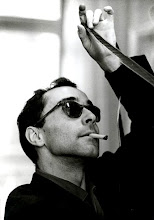
Every once in a while, a film comes along that is not the work of a director, but rather of an actor or actress (in this case the latter). In other words, "Pandora's Box" is not 'a film by G.w. Pabst', but rather 'a film starring Louise Brooks'. Her flawless portrayal of Lulu is perhaps the most brilliant performance ever given (especially considering Brooks was only in her early twenties). Perhaps this was because Louise Brooks and Lulu were one in the same - after all, Brooks later said that she was playing herself. In fact, Brooks supposedly became an 'escort' for a short period of time (after her career ended), much like Lulu near the end of the film. The end of Louise Brooks would not be nearly as depressing as the end of Lulu, however. Brooks was rediscovered in the 1950's thanks to a following in Europe (Cinémathèque Française curator Henri Langlois once said, "There is no Garbo, there is no Dietrich, there is only Louise Brooks."), and Brooks would live the last 30 years of her life (dying in 1985) with a popularity amongst film circles across the world.

"Pandora's Box" is the most hauntingly beautiful film ever made. It IS erotic. It IS bleak. It IS cinema. If I were to choose one film to explain the magic of cinema - this would be it. The picture seems so real and tragic that when Lulu's fate meets up with her, one must feel some sort of emptiness - as if they have just lost a person they really cared for. And yet at the same time, you know very well that Lulu's story must end this way - it's her destiny, her fate. To have it any other way (such as in the ending used in some markets, in which Lulu joins the Salvation Army), would seem out-of-place and very unusual considering the subject matter.

"Pandora's Box" is very much a modern Greek tragedy. Meaning it very well could have been written by Sophocles or Aeschylus, though in my honest opinion, I believe it far surpasses the work of either of them. As in much the same way as a ceiling painted by Michelangelo, a novel written by F. Scott Fitzgerald, or a song sung by Francoise Hardy or written by Bob Dylan, the work becomes synonymous with the creator (in this case Louise Brooks), so that the two no longer exist without one another, thus being invariably dependent on each other.
_02.jpg)
Watching this film, one is in voyeuristic bliss. As if we're peeping through a peephole and sitting in awe at the array of images before us. Its perfect juxtaposition of sex, violence, and tragedy make it such a beauty to behold. And in fact, the lack of sound - or rather dialogue - is what makes it even more lovely to see. Seeing it in a darkened room, alone, and with the music turned up, the film is not a film, but instead a montage of flickering images set to music - making it an enigma, a mystery. That is the magic of silent cinema, and that is a magic that a film with recorded dialogue could never even hope to attain.

